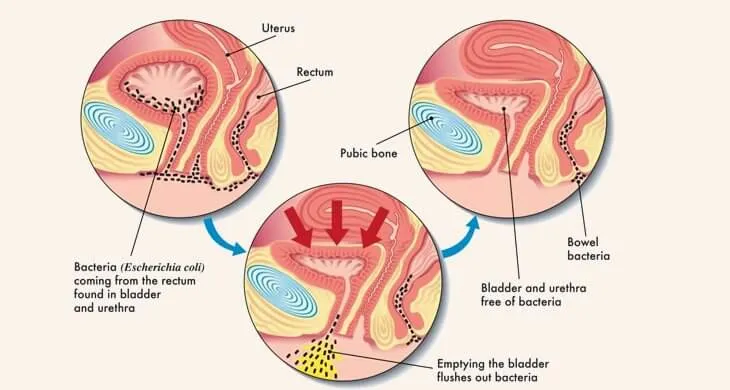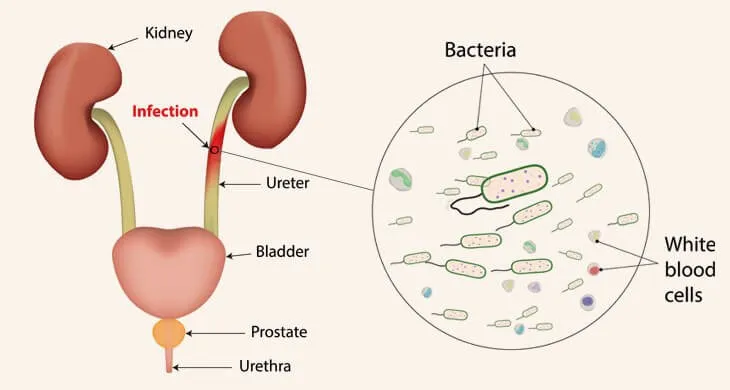Urinary Bladder Infection in Men and Women
Urinary Bladder Infection – an Overview
The bladder is an important component of the urinary tract as it stores urine before its elimination out of the body. Often, bacterial infection can affect this organ in both men as well as women. This condition has also got the name of urinary tract infection – UTI in short.
The following discussion explains what is urinary bladder infection along with its causes, symptoms and treatment.

Urinary Bladder Infection Causes
This infection occurs due to E. Coli bacterium. This bacterium is present in the large intestine and flourishes due to the acidic nature of urine. In normal individuals, the bacteria move out of the body as the urine passes out.
However, when the bacterium travels up the urethra, it infects the urine. Eventually, there is inflammation of the internal lining of the bladder. This is when the onset of the urinary bladder infection begins.
Bladder infection in women is more common in comparison with men. This is because in the case of women, the length of the urethra is shorter. As a result, the bacterium travels up to the bladder faster to cause the infection.
Moreover, the prostate gland protects the men. Also there is secretion of hormones which kill the bacteria. This leads to less common occurrence of bladder infection in men.
One or more of the following causes may trigger the condition.
- Advancing age puts individuals at a higher risk of urinary bladder infection. It is more common in women over the age of 40. This is because as a woman ages, there are changes in the lining of the urethra which make it more prone to infection. In addition, a decrease in the elasticity of the urinary bladder also contributes to the condition.
- Dehydration caused by insufficient intake of fluids may also lead to the infection.
- More women go through the condition when they are pregnant.
- Individuals with a narrow urethra or an enlarged prostate may more often suffer from the urinary bladder infection.
- Diabetic patients are at a higher risk of the diseases. This is because their urine contains a high amount of sugar. This is food for the bacteria which thrive on it.
- Improper hygiene after passing urine causes the bacteria to grow and spread.
Bladder Infection Symptoms
Individuals suffering from the urinary bladder infection usually go through one or more of the following symptoms.
- The urine becomes cloudy. Traces of blood may also pass into the urine.
- The urge to urinate becomes more frequent than usual.
- Urination is accompanied by a burning sensation or pain. This intensity of the pain depends on the severity of the infection.
- The patients feel painful cramps in the lower abdomen or the lower back.
- The urine smells foul.
- In case the infection spreads to other body organs – such as the kidneys – individuals may also suffer from more severe symptoms including fever, nausea, vomiting and severe back pain.
Bladder Infection Diagnosis
Individuals who experience any of the common bladder infection symptoms should consult a doctor before the condition grows worse. However, before the start of possible bladder infection remedies, a diagnosis is necessary to determine the infection as well as its severity.
The test for bladder infection diagnosis is the urinalysis. The doctor checks the levels of the following through this test.
- They measure the amount of white blood cells and red blood cells. A greater proportion of white blood cells is a clear indication of an infection.
- A higher level of nitrites may indicate that the kidneys are not flushing them out properly. This in turn gives an indication of the infection.
- A urine culture reveals the presence of bacteria. This is the most obvious sign of urinary bladder infection.
- The presence of certain other chemicals in the urine may also reveal infection.

Bladder Infection Treatment
After diagnosis, the doctor prescribes medication to fight the infection and the symptoms. This bladder infection treatment includes the following.
- Oral antibiotic medication is prescribed in order to kill the bacteria and get rid of the infection.
- You can relieve the symptoms such as pain through the use of pain killers.
- Individuals experience pain and burning sensation while passing urine. They can relieve it by the use of medicines, like Pyridium.
Bladder Infection Remedies
Other than the medication that the doctors prescribe, you can treat urinary bladder infection with the help of home remedies. Some of these useful remedies here.
- Individuals suffering from the infection should drink more water in order to overcome dehydration. It also helps the body produce more urine so that the bacteria can be flushed out. For this purpose, it is necessary to urinate more often instead of holding it for too long.
- The patients should avoid caffeinated beverages – such as tea, coffee and fizzy drinks. This is because caffeine usually acts as an irritant for the lining of the bladder. Therefore, the intake of caffeine can make the condition worse when one is going through a bladder infection.
- You can use heating pads to relieve abdominal and back pain. These are easily available at a local drug store. Alternatively, soaking a towel in warm water will also work.
- Wearing tight undergarments or trousers can be harmful. This is because tight clothing creates a warm environment which is perfect for bacterial growth. It is, therefore, better to wear cotton undergarments and lose clothing when an individual is suffering from the infection.
- Cranberry juice has been in use for ages as an effective home remedy against urinary tract infection. Consuming the juice can relieve the symptoms.
Prevention
Although treatments are available, the following measures offer effective prevention to help you avoid all the trouble.
- Proper hygiene should be maintained so that the bacteria do not flourish.
- Both men and women should consume six to eight glasses of water per day in order to flush out the bacteria and avoid dehydration.
- Avoid wearing tight undergarments and pants.
- Women who suffer from frequent occurrence of the condition should use antibiotics over a course of time as a preventive measure.


